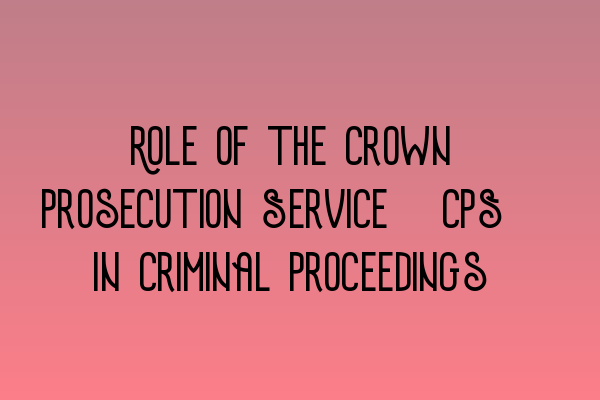Role of the Crown Prosecution Service (CPS) in Criminal Proceedings
The Crown Prosecution Service (CPS) plays a crucial role in the criminal justice system of the United Kingdom. It is responsible for prosecuting criminal cases on behalf of the state, ensuring that justice is served and the interests of the public are protected. Understanding the role and functions of the CPS is essential for aspiring criminal law practitioners preparing for the SQE exams. To excel in these exams, it is important to familiarize yourself with the key concepts and intricacies of the CPS’s involvement in criminal proceedings.
The Core Functions of the CPS
The CPS is tasked with making decisions on whether to prosecute individuals who have been accused of committing criminal offenses. These decisions are made impartially and independently, based on the evidence presented by the police or other investigative agencies. The CPS also works closely with these agencies to gather additional evidence, as required, to build a strong case against the accused.
The CPS is responsible for ensuring that cases brought before the courts are conducted fairly and effectively. They provide legal advice to the police during the investigation process, guiding them on the strength and sufficiency of the evidence gathered. This helps in ensuring that only cases with a realistic prospect of conviction proceed to prosecution.
Furthermore, the CPS is involved in the preparation and presentation of the case in court. The prosecution barristers, who are employed by the CPS, represent the state and present the evidence against the accused. They advocate for justice and strive to secure convictions when the evidence supports it. On the other hand, they must also be fair and objective, ensuring that the accused’s rights are protected and that the principle of innocent until proven guilty is upheld.
Collaboration and Cooperation
The CPS operates in close collaboration with other key players in the criminal justice system, such as the police, courts, and defense solicitors. This collaboration ensures that cases are handled effectively and efficiently, with all parties working together to ensure justice is served.
In addition to their core functions, the CPS also works towards the improvement of the criminal justice system. They actively engage in initiatives to enhance the quality of prosecution, such as providing training and guidance to their prosecutors, refining evidential and charging standards, and promoting consistency in decision-making.
Preparing for the SQE Criminal Law & Practice Exam
For those preparing for the SQE Criminal Law & Practice exam, it is vital to have a solid understanding of the role and functions of the CPS. Familiarize yourself with the CPS Guidelines and Codes of Practice, as they provide valuable insights into how the CPS operates and prosecutes cases. It is also beneficial to practice analyzing case scenarios and applying the relevant CPS guidelines to make informed decisions on whether to prosecute.
To excel in your preparation, make use of SQE sample papers and mock exams. The SQE sample papers provided by SQE Criminal Law & Practice Law UK are excellent resources to test your knowledge and practice applying your understanding of the CPS’s role in criminal proceedings. Take advantage of the SQE sample papers to identify areas of improvement and focus your study efforts accordingly.
Furthermore, consider enrolling in focused training programs, such as the SQE preparation courses offered by SQE Criminal Law & Practice Law UK. These courses are designed to equip you with the knowledge and skills needed to tackle the SQE exams with confidence. They cover key concepts, case studies, and provide comprehensive guidance on the role of the CPS throughout criminal proceedings.
To maximize your chances of success in the SQE exams, regularly review your performance in mock exams and adjust your study strategy accordingly. Utilize SQE mock debrief sessions to gain critical feedback and insights into areas where you need improvement. Post-mock feedback sessions are also valuable in refining your approach and enhancing your overall performance.
Conclusion
The Crown Prosecution Service (CPS) plays a vital role in the criminal justice system, ensuring that cases are prosecuted fairly and effectively. Understanding the functions and responsibilities of the CPS is essential for aspiring criminal law practitioners preparing for the SQE exams. By familiarizing yourself with the role of the CPS and utilizing resources like SQE sample papers and mock exams, you can enhance your knowledge and skills, and ultimately improve your performance in the criminal law and practice exams.
Related Articles:
